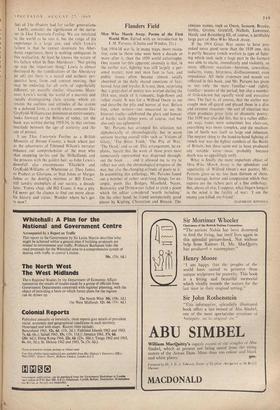Flanders Field
Men Who March Away. Poems of the First World War. Edited with an introduction by I. M. Parsons. (Chatto and Windus, 21s.) ' THE 1914-18 war is, in many ways, more evoca- tive, even to those who were born a decade or more after it, than the 1939 world catastrophe.
One reason for this apparent anomaly is that, in the earlier war, fighting was .still largely a per- sonal matter; man met man face to face, and public issues often became • almost totally absorbed in the daily shared emotions of fear, hatred, love and loyalty. It is not, then, surprising that a great deal of poetry was written during the 1914 war, much of it romantic, high-flown and rather exalte. It was for a Wilfred Owen to see and describe the pity and horror of war. Before him, other writers-too unscarred to see the bitterest truths-celebrated the glory and honour of battle; such things were, of course, real but also only too ephemeral.
Mr. Parsons has arranged his selection not alphabetically or chronologically, but in seven sections bearing overall titles such as 'Visions of Glory,' The Bitter Truth,' The Pity of War,' 'The Dead,' and so on. This arrangement, he ex- plains, 'meant that the work of those poets most numerously represented was dispersed through- out the book . . . and it allowed me to try to reflect not only the chronological progress of the war, but also the changing attitude of poets to it: In assembling this anthology, Mr. Parsons found out a number of rather surprising things; for ex- ample, poets like Bridges, Masefield, Noyes, Bottomley and Drinkwater failed to yield a poem which the editor considered 'worth including.' On the other hand, he found unexpectedly good pieces by Kipling, Chesterton and Binyon. The obvious names, such as Owen, Sassoon, Brooke, Sorley, Graves, Grenfell, Nichols, Lawrence, Hardy and Rosenberg fill, of Course; a justifiably large part of Men Who March Away.
If the 1914 Great War seems to have pro- voked more good verse than the 1939 one, this is partly because trench warfare (a type of fight- ing which took such a huge part in the former) was able to excite, immediately and violently, so many different reactions-heroism, cowardice, audacity, irony, bitterness, disillusionment, even impudence. All thee responses and moods are reflected in this book, and Mr. Parsons has given us not only the most familiar-and rightly familiar-poems of the period, but also a number of little-known but equally vivid and evocative ones. The fact is, of course, that the earlier war caught men off-guard and placed them in a dire and extreme situation-the sort of situation that often produces great lyric or dramatic poetry. The 1939 war also did this, but in a rather differ- ent way; issues were soMetimes less clear-cut, everything was more complex, and the mechan- ism of battle was itself so large and inhuman. The nearest thing to the hand-to-hand fighting of - trench war was the fighter combats of the Battle of Britain, but these seem not to have produced any notable verse-most probably because death was so appallingly swift.
What is finally the most important object of Men Who ,Viarch Away is the splendour and superiority of Wilfred Owen's war poems; Mr. Parsons gives us no less than thirteen of them. The courage, horror and compassion which they express are the richest part of a fine anthology. But, above all else, I suppose, what lingers longest in the mind is the futility of war: 'I am the enemy you killed, my friend.'
1.(ABETli JENNI






























 Previous page
Previous page